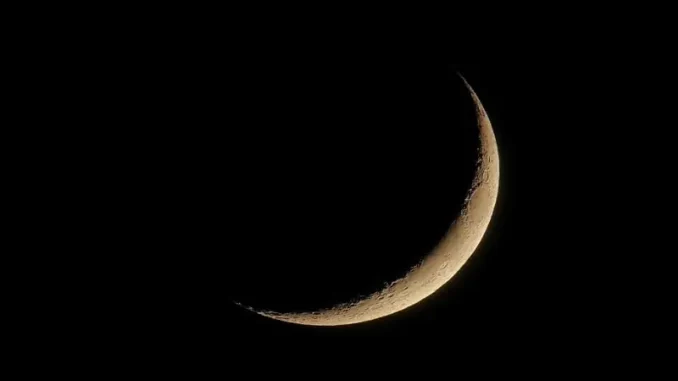
As one of the most significant events in the Islamic calendar, Eid-ul-Fitr marks the end of Ramadan, the month of fasting.
In Nigeria, as in many other countries, the sighting of the moon plays a crucial role in determining the exact date of Eid 2024.
In this article, we’ll delve into everything you need to know about moon sighting and Eid 2024 in Nigeria.
Eid 2024 in Nigeria.
As for Eid 2024 in Nigeria, the exact date will be confirmed based on the sighting of the new moon. Muslims across the country will eagerly await the announcement from the moon sighting committee or relevant authorities.
Once the crescent moon is sighted and verified, Eid celebrations will commence, marking the joyous culmination of Ramadan.
Saudi declares Wednesday Eid-ul-Fitr
Saudi Arabia has declared Wednesday, April 10, as Eid-ul-Fitr, after the crescent Moon was not spotted on Monday evening.
The Kingdom announced that the holy month of Ramadan would, therefore, last 30 days this year.
Haramain News in a statement on its X (Twitter) handle, said: “The crescent moon was NOT sighted in Saudi Arabia. Therefore, Eid-El-Fitr will be celebrated on Wednesday, 10th April 2024.
May Allāh allow us to utilise the remaining moments of this blessed month to engage in that which pleases Him, may He accept our siyām, qiyām & a’māl & may He allow us to witness many more Ramadāns in good health. Āmīn,” it wrote.
Sultan declares Wednesday Eid el Fitr
His eminence Sultan Muhammad Sa’ad Abubakar and president General Nigeria Supreme council for Islamic affairs (NSCIA) has declared Wednesday the 10th of April 2024 as the first day of Shawwal 1445AH (Eid el Fitr Day) as moon is not sighted anywhere in Nigeria.
Sultan made the statement shortly after receiving the Sultanate Council Advisory Committee in Religious Affairs in conjunction with the National Moon Sighting Committee.
The committee in their report stated that it had not received any report from various moon sighting committees across the country confirming the sighting of the new moon of Shawwal 1445AH on Monday 8th April 2024 which was the 29th day of Ramadan 1445AH.
The statement further reads, “Tuesday 9th April 2024 is the 30th day of the month of Ramadan 1445AH.
His eminence, the Sultan after accepting the report, declared Wednesday 10th April 2024 as the first day of Shawwal 1445AH (Eid el Fitr Day) accordingly.”
In the light of this, it is important to understand few things about moon sighting and Eid, as well as their significance in Islam:
Significance of Moon Sighting
Moon sighting holds immense significance in Islam as it marks the beginning and end of lunar months, including Ramadan and Shawwal (the month of Eid).
According to Islamic tradition, Eid al-Fitr, the festival of breaking the fast, begins with the sighting of the new moon, signaling the end of Ramadan. Therefore, Muslims eagerly await the sighting of the crescent moon to celebrate Eid.
Factors Affecting Moon Sighting
Several factors can influence the visibility of the new moon, affecting the timing of Eid celebrations. These factors include atmospheric conditions, geographical location, and the age of the moon.
Cloud cover, pollution, and other weather conditions can obstruct visibility, making it challenging to spot the new moon.
Moon Sighting Committee
In Nigeria, as in many other Muslim-majority countries, moon sighting committees are tasked with determining the beginning of Islamic months, including Ramadan and Shawwal.
These committees consist of religious scholars, astronomers, and government representatives who collaborate to observe the new moon and announce the start of Eid based on verified sightings.
Local Observations and Traditions
In addition to official moon sighting committees, local communities in Nigeria often engage in traditional practices to observe the new moon.
This may involve individuals or groups scanning the horizon after sunset to look for the crescent moon. In some cases, mosques and community centers organize gatherings to facilitate moon sighting efforts.
Global Coordination
With advancements in technology and communication, there is increasing coordination among Muslim communities worldwide regarding moon sighting.
International organizations and religious authorities work together to ensure consistency and unity in determining the beginning of Islamic months and festivals. This global coordination helps minimize confusion and discrepancies in Eid celebrations.
Celebrations and Traditions
Eid al-Fitr is a time of joy, gratitude, and community for Muslims in Nigeria. Families come together to attend special prayers at mosques, exchange greetings, and share festive meals.
Traditional dishes such as jollof rice, fried chicken, and sweets are prepared and enjoyed during Eid gatherings. Additionally, Muslims engage in acts of charity by giving alms to the less fortunate, known as Zakat al-Fitr.
Moon sighting plays a crucial role in determining the timing of Eid al-Fitr in Nigeria and other Muslim-majority countries.
As Muslims eagerly anticipate the sighting of the new moon, they come together to celebrate the joyous occasion of Eid, marking the end of Ramadan and the beginning of Shawwal – the tenth Lunar month.
By the virtue of observing traditional practices, coordinating globally, and relying on official moon sighting committees, Muslims ensure unity and consistency in Eid celebrations across the world.
Leave a Reply